You searched for: 早盘25分后选股现量【欧宝体育qee9.com】早盘集合竞价挂涨停卖ZFAUwMFG
<< Previous | Displaying results 101-125 of 173 for "早盘25分后选股现量【欧宝体育qee9.com】早盘集合竞价挂涨停卖ZFAUwMFG" | Next >>
-
Herschel Rosenblat
ID CardHerschel was the youngest of three sons born to Yiddish-speaking Jewish parents. When Herschel was a child, his family moved to Radom, an industrial city which had a large Jewish population. By 1930, Herschel had finished his schooling and was helping in his father's shoemaking business. With the help of a friend, he later found a full-time job as a house painter. 1933-39: Herschel's career as a painter was interrupted for two years when he was drafted into the Polish cavalry at the age of 20. When…
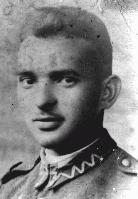
-
Henoch Kornfeld
ID CardHenoch's religious Jewish parents married in 1937. His father, Moishe Kornfeld, and his mother, Liba Saleschutz, had settled in Kolbuszowa, where Henoch's mother was raised. There, Liba's father bought the newlyweds a home and started his new son-in-law in the wholesale textile business. 1938-39: Henoch was born in late 1938, and was raised among many aunts, uncles and cousins. Around Henoch's first birthday, Germany invaded Poland and soon reached Kolbuszowa. Polish soldiers on horses tried to fight…
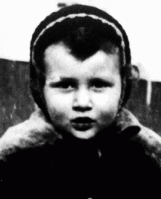
-
Shulim Saleschutz
ID CardShulim was the oldest of three children born to religious Jewish parents living in Kolbuszowa, a town in south central Poland. His father owned a wholesale general store in town, and was known in the region for his impressive strength. Shulim's mother tended to the house and cared for him, his brother, Shlomo, and his sister, Rozia. 1933-39: When Shulim was 9, the Germans invaded Poland. Polish soldiers on horses tried to fight against the German army, but they were no match against the tanks. After the…
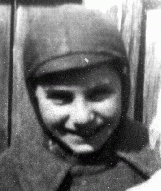
-
Blimcia Lische
ID CardBlimcia's parents were religious Jews. Her father, Shaya David, and her mother, Malcia Saleschtz, had settled in Kolbuszowa, where Blimcia's mother had been raised. There, Malcia's father bought the newlyweds a home and started his new son-in-law in the wholesale flour business. 1933-39: Blimcia was born in 1938, and was raised among many aunts, uncles and cousins. Around Blimcia's first birthday, Germany invaded Poland and soon reached Kolbuszowa. Polish soldiers on horses tried to fight against the…
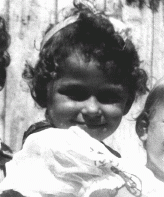
-
Preben Munch-Nielsen
ID CardPreben was born to a Protestant family in the small Danish fishing village of Snekkersten. He was raised by his grandmother, who was also responsible for raising five other grandchildren. Every day Preben commuted to school in the Danish capital of Copenhagen, about 25 miles south of Snekkersten. 1933-39: There were very few Jews in Preben's elementary school, but he didn't think of them as Jews; they were just his classmates and pals. In Denmark they didn't distinguish between Jews and non-Jews, they…
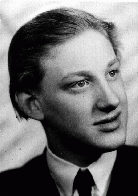
-
Fanny Judelowitz
ID CardFanny was the oldest of three girls born to a Jewish family in the Baltic seaport of Liepaja, a city with a large Jewish community in Latvia. Fanny attended a Jewish primary school there. Her parents owned and operated a shoe store and small shoe factory. 1933-39: As a young girl, Fanny's life revolved around activities with Betar, a Zionist youth movement founded in Riga in 1923. They had a group of about 25 boys and girls. They studied about Palestine and their Jewish heritage. In 1935 Fanny's mother…
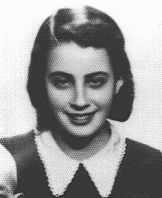
-
Jakab Katz
ID CardJakab, a religious Jew, was the father of eight children. In the early 1900s he sailed to America, paying his way by shoveling coal on the ship. In New York he earned enough money to help two of his daughters immigrate. Returning to Buj, he eventually moved his family to Zalkod, a small town in northeastern Hungary. There, helped by his wife, Terez, and his son, Miklos, he ran a store and a farm. 1933-39: Jakab's daughter, Sadie, and her two children, Lillian and Arthur, are visiting from America. The…
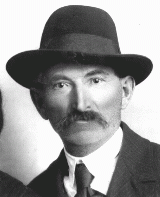
-
Terez Spitz Katz
ID CardA religious Jewish mother of nine, Terez settled with her husband, Jakab, and children in Zalkod, a small town in northeastern Hungary. Jakab ran a general store. Terez tended their sprawling farmhouse. She baked black bread in their wood-burning stove and canned the peaches and plums she gathered with her children and grandchildren from the family orchards. 1933-39: Terez's oldest daughter, Sadie, is visiting from America. Sadie comes with her parents every Friday when they take the horse-drawn wagon to…
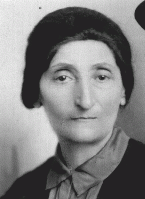
-
Janina Prot
ID CardJanina's parents had converted from Judaism to Catholicism in the 1920s. When Janina was 4 years old, her parents divorced; Janina left Warsaw and went to live with her father near the Polish town of Radom, while her brother Tomas remained in Warsaw with his mother. Janina, or Jana as she was affectionately known, loved to read. 1933-39: When Jana was 12 she moved back to Warsaw to attend secondary school, and stayed with her mother. A year later, on September 8, 1939, the Germans were bombing Warsaw.…
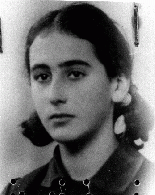
-
Rivka Rzondzinski
ID CardThe mother of six children, Rivka lived 35 miles east of Warsaw in the small predominantly Jewish town of Kaluszyn. The Rzondzinski family was very religious. When Rivka's husband, Fiszel, died in the early 1930s, she and her oldest daughter, Channa, opened a newspaper kiosk near the Kaluszyn railroad station. 1933-39: When Germany invaded Poland several days ago, Rivka's daughter Raizel's husband and her two sons fled eastward to the USSR with other Jewish men. They were afraid that the Germans would…
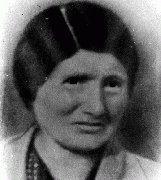
-
Herschel Gerszonowicz
ID CardThe fourth of eight children, Herschel was born to Jewish parents in south central Poland. His father was a machinist and locksmith. Herschel belonged to the Zionist youth organization, Ha Shomer ha-Tsa'ir, and played soccer for the Jewish team. When he was 14 years old, he left school to become apprenticed to his stepsister's father who was a tailor. 1933-39: Herschel was working as a tailor in Miechow when, on September 1, 1939, the German army invaded Poland. His parents decided that he and his…
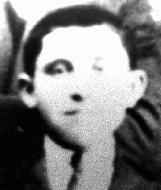
-
Izabella Katz
ID CardIzabella was one of eight children raised in a religious Jewish family in the small town of Kisvarda in northeastern Hungary. Every Friday Izabella and her brother and four younger sisters went to the library to borrow the maximum number of books for their mother. Izabella attended public schools and longed to move to a big city. 1933-39: Antisemitism was prevalent. Izabella can't count the number of times she was called "smelly Jew." Her family cringed at "Heil Hitler" speeches from Germany on the radio…
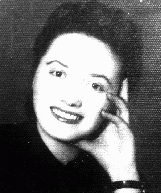
-
Raizel Kisielnicki
ID CardRaizel lived with her husband, Mojsze, and their three children in the small, predominantly Jewish town of Kaluszyn, which was 35 miles east of Warsaw. By the 1930s, Mojsze owned a grocery store, a restaurant, and a gas station, all of which were located together on the heavily traveled main road. The family lived in rooms in the same building as their business. 1933-39: Every day Raizel prepares the roast goose served in the family's restaurant. They have a bustling business, as many truck drivers stop…
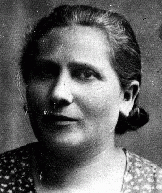
-
Chaie Sura Kisielnicki
ID CardChaie Sura was the youngest of three children born to Jewish parents living 35 miles east of Warsaw in the small, predominantly Jewish town of Kaluszyn. Her father owned a wholesale grocery store, a restaurant and a gas station, which were located together on the busy main road. The Kisielnicki family lived in rooms in the same building as their business. 1933-39: When Germany invaded Poland several days ago, Chaie Sura's father and brothers fled eastward towards the USSR with other Jewish men who were…
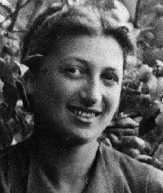
-
Ezra BenGershom
ID CardEzra was born to a Jewish family in the Bavarian city of Wurzburg. In the summer of 1929, his father, a third-generation rabbi, accepted a position as a district rabbi, guiding 12 congregations in Upper Silesia. In primary school, Ezra, who showed a keen interest in chemistry, was often harassed by his schoolmates for being Jewish. 1933-39: Because of his "Nordic" features, Ezra was able to frequent places where Jews couldn't go. In 1938, one year after he entered a Jewish secondary school in Berlin, the…
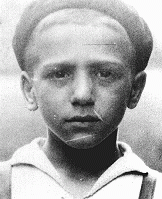
-
Taube Fishman Rosenblat
ID CardTaube, also known as Tola, was born to a Yiddish-speaking Jewish family. Her father worked as a tailor, and a wealthy uncle in Germany helped to support the large family. After finishing public school, Taube trained to be an embroiderer. She fell in love with Itzik Rosenblat, a young man who had first apprenticed with her father in 1925 when Taube was 8 years old. 1933-39: In 1938, after a 13-year courtship much opposed by her family, Taube married Itzik without getting her dowry. The couple lived in an…
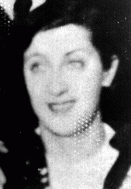
-
Irena Elzbieta Wos
ID CardIrena was the second of four children born to religious Roman Catholic parents in Poland's capital of Warsaw. Irena's father owned a successful textile business. When Irena was 10, her family moved to a comfortable apartment near the Royal Castle and the Vistula River. In 1930 Irena entered a private grade school. 1933-39: At 14 Irena began secondary school. She was a good student and wanted to be a doctor. On September 1, 1939, the day she was supposed to begin the new school year, the Germans attacked…
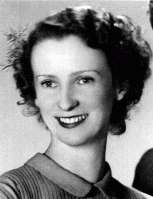
-
Judith Schwed
ID CardJudith was the older of two children born to Jewish parents in the town of Kiskunfelegyhaza in southeastern Hungary. Her mother, Anna, and her mother's sister, Kornelia, were close in age and had a contest to see who would be the first to have a baby. Judith's Aunt Kornelia won the contest and cousin Maria was born in December 1931, just three weeks before Judith. 1933-39: Judith's father had a prosperous wholesale business that sold goose meat, down, feathers and quilts. In 1939, the same year that…
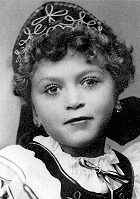
-
Atrocities against Burma's Rohingya Population
ArticleThe Burmese military has targeted the Rohingya people because of their ethnic and religious identity. The military’s actions constitute genocide and crimes against humanity. Learn more
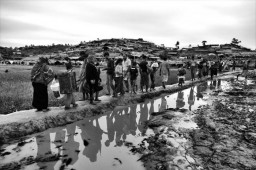
-
Drexel Sprecher describes war-damaged Nuremberg
Oral HistoryDrexel Sprecher was educated at the University of Wisconsin, the London School of Economics, and at the Harvard School of Law before receiving a position at the US Government's Labor Board in 1938. He enlisted in the American military after the United States declared war on Germany, and was posted to London. After the war, Sprecher served as a prosecutor of Nazi war criminals at the Nuremberg trials.
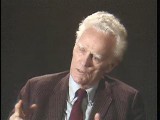
-
Immediate American Responses to the Nazi Book Burnings
ArticleThe Nazi book burnings of 1933 sparked responses from anti-Fascist organizations, Jewish groups, and writers in the United States. Learn more.
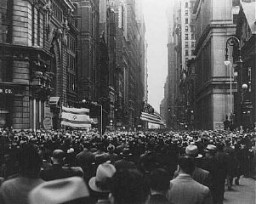
-
The Treatment of Soviet POWs: Starvation, Disease, and Shootings, June 1941–January 1942
ArticleThe Nazi treatment of Soviet prisoners of war (POWs) was determined by Nazi ideology. Cruel conditions included starvation, no medical care, and death.
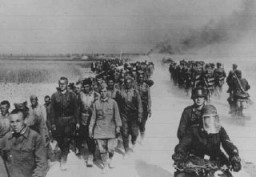
-
Hainewalde
ArticleThe SA established a protective custody camp at Hainewalde in March 1933. Well-known journalist and writer Axel Eggebrecht was among its early prisoners.
-
Ravensbrück
ArticleLearn about conditions and the treatment of prisoners in Ravensbrück, the largest concentration camp for women in the German Reich.
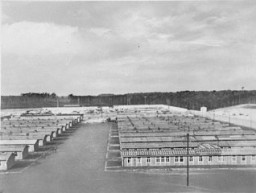
-
Ardeatine Caves Massacre
ArticleNow a national memorial site, the Ardeatine Caves outside Rome were the site of a German reprisal for a bombing by Italian resistance operatives in March 1944.
